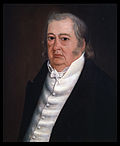Wikipedia:Today's featured article/requests/James Garrard
James Garrard[edit]
This nomination predates the introduction in April 2014 of article-specific subpages for nominations and has been created from the edit history of Wikipedia:Today's featured article/requests.
- This is the archived discussion of the TFAR nomination for the article below. Subsequent comments should be made on the appropriate discussion page (such as Wikipedia talk:Today's featured article/requests). Please do not modify this page.
The result was: scheduled for Wikipedia:Today's featured article/June 7, 2013 by BencherliteTalk 13:28, 2 June 2013 (UTC)
James Garrard (1749–1822) was the second governor of Kentucky from 1796 to 1804 and the last elected to consecutive terms until 1999. A Revolutionary War veteran, he held several local offices and unsuccessfully tried to exclude slavery from Kentucky's first constitution. His 1796 election as governor exposed ambiguity in the state constitution, prompting another constitutional convention in 1799. As governor, he opposed the Alien and Sedition Acts, favored passage of the Kentucky Resolutions, and lobbied for public education, militia and prison reforms, business subsidies, and legislation favorable to debtors. He became the first resident of the state's first governor's mansion when it was completed in 1798. A Democratic-Republican, he applauded the Louisiana Purchase as a means of dealing with the closure of the port at New Orleans to U.S. goods. Garrard, a Baptist minister, was expelled from the church in 1802 when his Secretary of State, Harry Toulmin, persuaded him to adopt some doctrines of Unitarianism. After leaving office, he engaged in agricultural and commercial pursuits. Garrard County, Kentucky, was named in his honor. (Full article...)
1 point for FA for more than a year, took office on 7 June, --Gerda Arendt (talk) 22:56, 10 May 2013 (UTC)
- Blurb is 150 characters too long, please trim. BencherliteTalk 20:06, 11 May 2013 (UTC)
- I asked the main author to have a look first, --Gerda Arendt (talk) 22:01, 14 May 2013 (UTC)
- Sorry for the delay. Been on the road for a couple of days. I've done some trimming, but also added information about the 1796 election, which was critical in prompting a second constitutional convention in Kentucky. That constitution, in turn, enacted the consecutive term restriction that wasn't lifted until the late 1990s. The election and its aftermath are a major part of Garrard's legacy. Truthfully, Benjamin Logan probably should have been governor in 1796. Acdixon (talk · contribs) 14:18, 16 May 2013 (UTC)
- I asked the main author to have a look first, --Gerda Arendt (talk) 22:01, 14 May 2013 (UTC)

